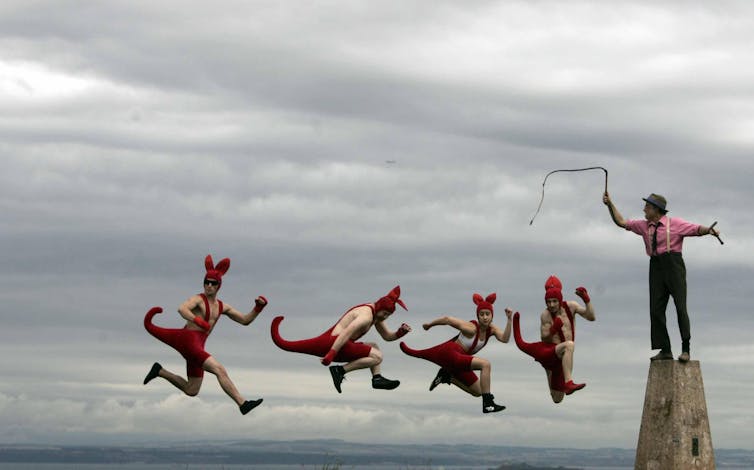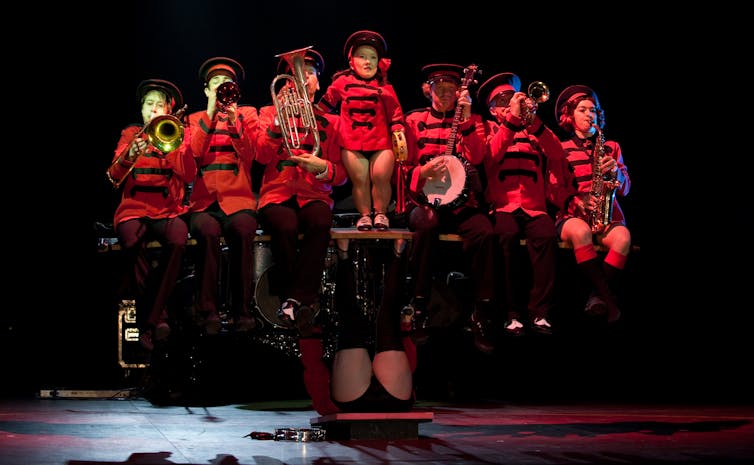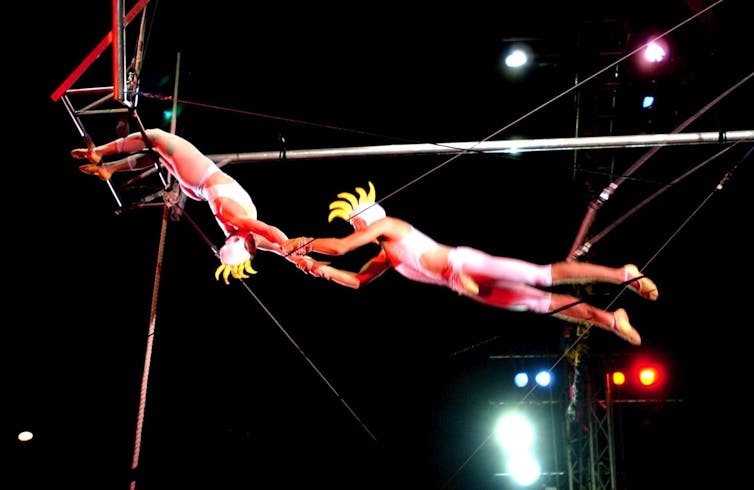Image: AAP Image/Julian Smith
In 1980, I was in London and working at the Roundhouse performing arts centre.
Thelma Holt, the legendary director of the Roundhouse, told me she had booked an Australian circus to perform. She asked me had I heard of them. I said no. I had been in England for a few years, so I was out of touch with what was happening in Australia. I knew though, of some former peers at Flinders, who had formed something called the New Circus. But I had not heard of Circus Oz.
Given I was the only Australian working at the Roundhouse at the time, I was self-conscious about who this group was, and what they would be like. Typical cultural cringe.
Of course, they were a revelation. So joyous, funny, imaginative, talented and witty. I felt so proud to be an Australian. They took something that was intrinsically Australian and showed it to the world. It was a moment in history when expatriate Australians such as myself could feel proud about who we were, and no longer needed to apologise for being lesser beings.
Established in December 1977, Circus Oz showed the world Australia was unique, Australians were capable of doing incredible things, and they had something special to offer on the world stage.

It brought to the stage a model of circus that didn’t exploit animals but joyously celebrated the human form. Outstanding individuals such as Jonno Hawkes, Robyn Laurie, Tim Coldwell, Anni Davey, Sue Broadway and numerous other wonderful performers, designers, musicians and directors were part of this world. Then there were the individuals on the administrative side, such as Linda Mickleborough, who committed herself to nurturing and supporting the company for more than 20 years.
Today, we heard Circus Oz is to be no more. Why this is happening, I am not sure. The official statement is rather full of management language that obfuscates rather than clarifies. No doubt a backstory will come out, but nevertheless it is very sad. It suggests the funders want the company to become something that is against its very nature. It may also be another arts victim of the past two years.
The end of an era
Circus Oz has been doing Australia a service for many years. We have all come to take it for granted. It has been travelling around the world promoting what is unique about Australia and winning acclaim in New York, London, Paris and everywhere in between. It has also been travelling around Australia making Australians feel proud about their culture.

It has shown countless young people there are alternative careers to being stuck in a factory or office. It has celebrated Indigenous culture, and protested about the things Australia is least proud of.
It has encouraged the creation of new circuses and the beauty of physical theatre around the country. Circuses such as the Flying Fruit Fly Circus in Albury/Wodonga, Gravity & Other Myths in Adelaide, Circa in Brisbane and numerous other groups that have been so important to the making of physical theatre in Australia.
Read more: Circus Oz- an interview with Rob Tannion
Generations of performers have trained with Circus Oz and then gone on to work with them and other circuses around the world. The National Institute of Circus Arts in Melbourne would not exist without Circus Oz, nor would Cirkidz in Adelaide.
Circus Oz also pioneered how a performing arts group could be organised and be self-managed. Everyone earned the same wage, and everyone participated in decision-making. It was a role model for collective and collaborative leadership. It gave performers a sense of being more than a performer: the artists were treated as adults who had something to contribute to how their world was constructed and managed.

Business, or creativity?
Circus Oz was a pioneer in being acknowledged as a major player in Australian performing arts by being accepted into the hallowed framework of the Major Performing Arts Framework at the Australia Council. This meant it joined the opera companies, ballet and theatre companies and was granted on-going guaranteed funding.
But perhaps this acceptance into the mainstream has also been its downfall. It then had to conform to management expectations, that as an entity, are foreign to its own culture and framing. The corporatisation of the arts has been an ever-increasing challenge for arts practitioners. It is foreign to the very making of art when business paradigms rule instead of creativity. It is particularly foreign to an entity that was founded on worker entitlements, collective management models and democratic principles.
Circus Oz has been a special gift to Australia and the world. We will all miss it deeply.
This article was written by:
Disclosure statement
Jo Caust is a member or the Arts Industry Council (SA) and NAVA. She has previously received funding from the Australia Council.







